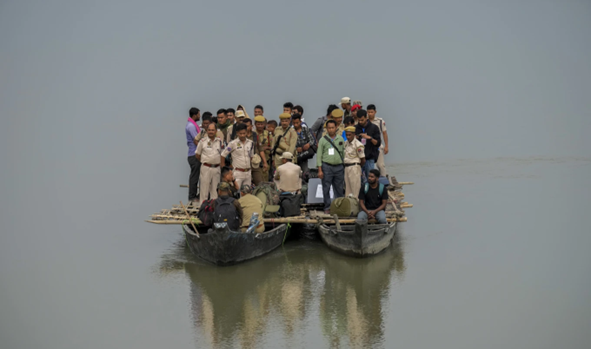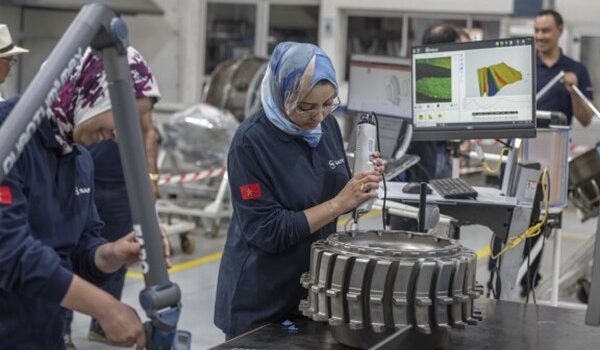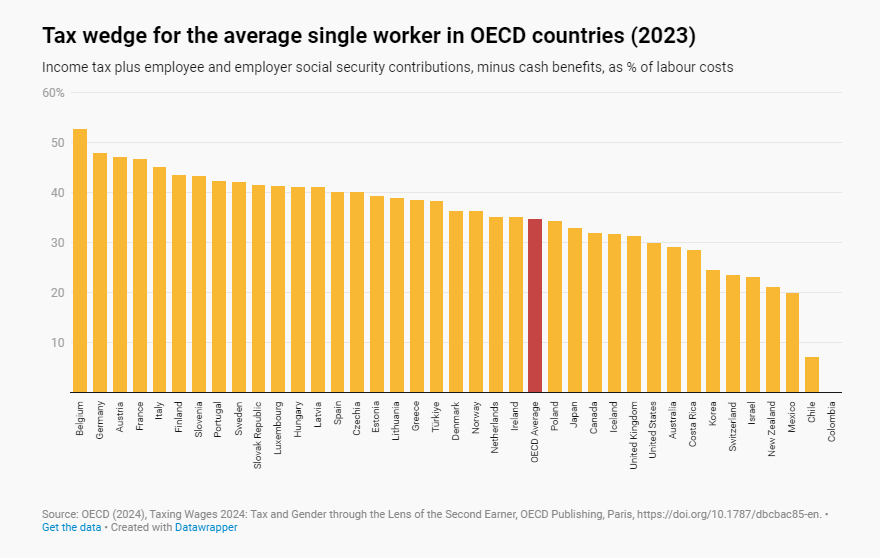
Welcome to Future Trends – the must-read weekly briefing covering the fast-changing face of global politics, economics, development, social and conflict, curated by the Institute for Economics & Peace.
Here’s what you need to know this week:
↗️ Share Future Trends on X
🌐 Reading Future Trends for the first time? Sign up here.

Ferrying voting machines to remote areas in India is a Herculean task. Election officials are traveling through jungles and snow-covered mountain tracks, even wading through rivers to set up polling stations in tents, shipping containers, and school buildings in remote areas.
Portugal needs to ‘pay the costs’ of slavery and colonialism, says president. The country’s president, Marcelo Rebelo de Sousa, said Portugal takes full responsibility for the wrongs of the past and that those crimes, including colonial massacres, and should pay reparations.
Modi accused of using anti-Muslim statements at election rally. India’s main opposition party has accused Prime Minister Modi of using hate speech after he called Muslims “infiltrators,” with too many children, days after the country began its weeks-long general election.
Ukraine Agriculture Minister accused of corruption. The minister’s involvement in an illegal acquisition of state-owned land worth about $7 million has made him the first known minister under President Volodymyr Zelensky to be named a suspect in a corruption case.
UN peacekeeping mission MONUSCO leaves Congo. After 25 years the UN peace keeping mission, MONUSCO, is leaving the DRC after a request from the government. There are concerns the security situation may deteriorate especially in South Kivu.
Humza Yousaf quits as Scotland’s first minister. Yousaf said he was quitting as head of the pro-independence Scottish National Party and first minister of Scotland’s devolved government after a week of chaos triggered by his scrapping of a coalition agreement with Scotland’s Greens.
Vietnam parliament chief quits amid deepening political turbulence. The chairman of Vietnam’s parliament Vuong Dinh Hue resigned over unspecified “violations and shortcomings”, the ruling Communist Party said, a new sign of political turbulence weeks after the dismissal of the country’s president.

Israel offers 40-day ceasefire in exchange for hostages held by Hamas. The deal would involve the release of up to 40 hostages from the remaining 130 hostages believed to be held by Hamas, plus thousands of Palestinian prisoners held by Israel. The US, UK and other leaders urged Hamas to take the deal.
Houthis continue attacking ships in Red Sea. Yemen’s Houthis said their missiles hit the Andromeda Star oil tanker in the Red Sea, as they continue attacking commercial ships in the area in a show of support for Palestinians fighting Israel in the Gaza war.
Thailand urges bigger ASEAN role in resolving Myanmar conflict. After weeks of fighting near its border that halted trade and led to a brief influx of refugees, Thailand called for the regional bloc ASEAN to take a more proactive role in trying to resolve the crisis in military-ruled Myanmar.
Swiss parliament backs $5.5 billion aid plan for Ukraine. A Swiss parliamentary committee voted to back a $5.5b aid contribution for Ukraine as part of a package aimed at improving Switzerland’s defence capabilities.
Evidence of torture as nearly 400 bodies found in Gaza mass graves. Mass graves were found in two hospitals in the Gaza Strip containing nearly 400 bodies which showed signs of torture and execution, Palestinian Civil Defence officials said.

Plane makers look to new manufacturing hubs. Morocco is among countries vying for contracts with big manufacturers looking to speed up production and deliver more planes to meet demand. Companies like Boeing and Airbus are outsourcing design, production, and maintenance to countries from Mexico to Thailand.
Tesla’s profits fell by 55% in the first quarter. This adds to investors’ concerns about the company’s strategy amid increased competition. Elon Musk recently said that Tesla would focus on autonomous driving technology which challenges the company’s promise to lower the price of its vehicles.
US GDP falls short of expectations, growing calls for potential stagflation. Gross domestic product expanded 1.6% in the first quarter, lagging the 2.4% projected by economists, while inflation continues to be firmer than expected in March.
Nigeria seeking fund managers for $10 billion diaspora fund. The fund seeks to pool together billions of dollars remitted monthly by its citizens oversees for investments, including infrastructure, healthcare and education.
‘End of oil not in sight’, according to OPEC Secretary General. The Organization of the Petroleum Exporting Countries believes oil use will keep rising in coming decades, in contrast to bodies such as the International Energy Agency, which predicts it will peak by 2030.

Blow for workers as inflation drives real wages down. A second consecutive year of high inflation pushed up labour taxes across OECD countries in 2023. The OECD reported effective tax rates on labour incomes rose in most OECD countries with the post-tax or real income of workers earning the average wage declining in 21 out of 38 OECD countries.
Malawi gets $58 million World Bank grant to address food crisis. Support comes in the context of the severe food crisis the country is suffering due to El Niño conditions in the wider southern Africa region. A series of intense disaster events over the last few years has left little time for the country to recover.
US EPA expected to drop hydrogen from future power plans. The US is expected to drop green hydrogen from its landmark plan to slash greenhouse gas emissions from the power sector, to reduce the risk of lawsuits if the emerging technology doesn’t reach commercial scale.
Biden sets new target to protect US water sources. The US administration set a new goal to protect vast water sources, from rivers to wetlands, as part of a series of announcements marking Earth Week, including 3.2m hectares of threatened wetlands and 160,000km of rivers and streams.
India expects annual power output to grow fastest in a decade. This is expected to boost demand for fossil fuel-fired power, which is projected to grow at 9.3% and account for over 76% of total output for the second straight year.

Pro-Palestine protests sweep US colleges. Student protests in the US over the war in Gaza have intensified and expanded, with encampments now in place at colleges including Columbia, Yale, and New York University.
Patch to protect against measles in children shows promise. A vaccine patch could be a safe and effective alternative way to protect young children against measles, a trial in Gambia suggests. The patch is easier to transport and store than standard injections, especially in remote areas and can address falling vaccination levels since the Covid pandemic.
Millions of Afghans hide in Pakistan to escape deportation. Some 600,000 Afghans have been returned home since last October, when the crackdown began, leaving at least a million remaining in Pakistan. Many of the remaining Afghans were born in Pakistan.
Dubai’s ruler announces construction of world’s largest airport terminal. Dubai has started work on a $35bn airport terminal that is set to handle up to 260 million passengers annually. The new terminal would be five times the size of the current Dubai International Airport, said Dubai’s Prime Minister, Sheikh Mohammed.
Pre-Roman necropolis unearthed in southern Italy during excavations. A necropolis with rich grave artifacts such as weapons and bronze ornaments has been found 50km from Naples during preliminary excavations to build an electric station. The best-preserved archaeological evidence dates between the end of the Iron Age and the 8th-7th century B.C.